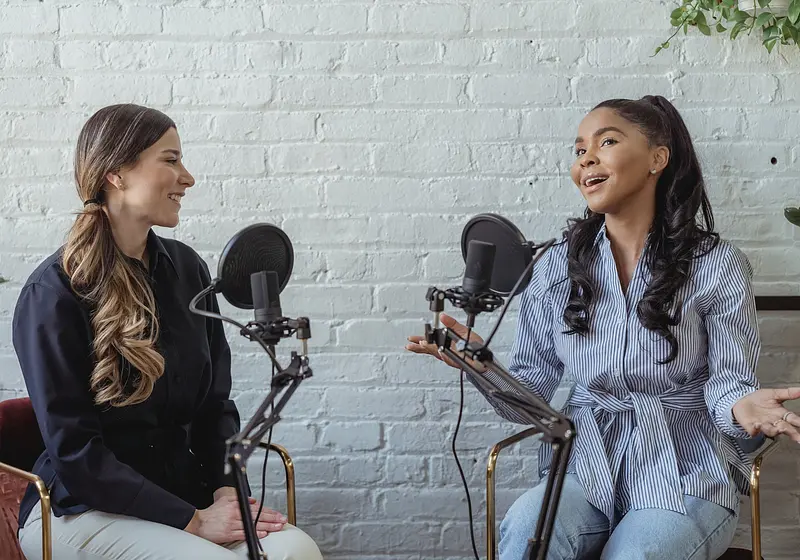Podcasts offer an exciting avenue for teens to find their voice and share their perspectives with a global audience. Beyond being a platform for self-expression, delving into podcasting can transform into a rewarding extracurricular activity. So, whether it's exploring niche interests, sharing captivating stories, or discussing pressing issues, podcasting emerges as an empowering and enjoyable avenue for teens to amplify their voices and leave a lasting impact in the digital soundscape.
Let us slide into your dms 🥰
Get notified of top trending articles like this one every week! (we won't spam you)Step 1: Structure
Podcast Format
First things first, decide the style of your podcast. Here are a few popular formats to consider:
- Interview Style: Connect with inspiring people from specific niches. Keep it unscripted, free-flowing, and require minimum editing.
- News/Current Events Show: Focus on hot topics like sports, politics, or technology to provide fresh content consistently.
- Multi-Host Show: Share the hosting responsibilities with more than two people, usually creating an entertaining and conversational tone.
- Solo Show: A one-man show, you can narrate stories about your podcast's theme and try to occasionally invite guests to keep things interesting.
Podcast Theme
Secondly, determine your podcast theme. Will you interview up-and-coming visual artists? Or maybe talk about your favorite baked goods and your up-and-coming bakery business? Maybe you'll make a show about your student experience and empowering tips for upcoming students.
There are several different themes and many different and unique methods to present your topic(s).
Here are a couple of general topics:
- Food
- Health and Beauty
- Finances
- Empowerment
- Fitness
- Music and Culture
- Horror
- Education
- Personal Life
- Dating/Romance
***Don't be afraid to mix and match and create a podcast with multiple themes. Think about your favorite podcasts. They most likely mix different topics and themes or maintain a strong basis on one or more to make them more memorable to listeners.
Podcast Frequency
Now, consider your posting frequency. Determine how often you'll post episodes based on your schedule. Are you committing to a daily, weekly, or bi-monthly release? Choose a schedule that aligns with your activities and school commitments.
Podcast Providers
Don't forget to think about a podcast provider! Will your show be available on Spotify, Apple Music, or both?
Moreover, we're in an era where individuals often film podcasts. If you're intrigued by the idea, consider which platforms you prefer to share your podcast, such as YouTube or TikTok.

Take the Quiz: Which aespa Member Are You?
Find out which aespa member you resemble!
Step 2: Execution
Now, let's bring your podcast to life!
Creating the Podcast Episode:
Write a script or guide based on your podcast style. Whether you go detailed or keep it light, having a script ensures you cover all your bases.
Editing the Podcast Episode:
Tailor your editing process to the length of your audio file and the number of participants. Convert the edited file to an MP3 format for publishing. Add metadata like your podcast name, logo, description, and website URL to optimize search results.
Posting the Podcasts:
When posting your podcast, you need a general synopsis to let the reader know what your podcast is about and if it's something they would be interested in. Try to use these questions to help guide how to write a synopsis:
- What is your podcast about?
- Who is your podcast for?
- What can listeners expect?
- Why should people listen to your podcast? What will they gain from listening?
- How often/when do you release new episodes?
- Where can people connect with you other than by listening to your podcast?
Don't forget to use resources like Grammarly and Spell-Check to avoid obvious grammar mistakes!
Time Management:
High school schedules can be hectic, but finding dedicated time for your podcast is essential. Consider creating a weekly or bi-weekly schedule that aligns with your other commitments. Allocate specific time blocks for researching, recording, and editing to maintain a consistent podcasting routine.
Leverage School Resources:
Many schools offer resources like recording studios or media labs. Check with your school's administration to see if there are facilities you can use. This not only provides a professional touch to your podcast but also connects you with potential mentors or advisors.
Involve Peers:
Turn your podcast into a collaborative project. Involve friends or classmates who share similar interests. This not only lightens the workload but also brings diverse perspectives to your podcast, making it more engaging for listeners.
Class Projects Integration:
If possible, integrate podcasting into your class projects. Speak to your teachers about incorporating podcast episodes as part of assignments. This not only aligns with your academic responsibilities but also allows you to showcase your podcasting skills in an educational context.
Utilize Weekends and Breaks:
Weekends and school breaks provide an excellent opportunity to dedicate extended periods to podcasting. Use this time to plan, record, and edit without the pressure of immediate academic deadlines.
Learn as You Go:
Podcasting is a learning process. Embrace the learning curve and use it as an opportunity to develop new skills. Learn about recording, editing, and content creation gradually. Don't be afraid to experiment with different formats to discover what works best for you.
Balance is Key:
Maintaining a balance between academics, extracurriculars, and podcasting is crucial. Ensure that your podcasting endeavors enhance your overall high school experience rather than becoming a source of stress.
Pro Tip: Make your podcast memorable and fun by adding an intro and outro. Create a jingle, host a game, or use free-stock music to set the mood.
Step 3. Advertising
Now that your podcast is ready to hit the airwaves let's talk about getting the word out. Building an audience is a key step, and here's how you can do it:
Social Media Promotion:
Utilize the power of social media platforms. Share snippets and behind-the-scenes content, or even go live to connect directly with your audience. Platforms like Instagram, Twitter, and TikTok are excellent tools for building a community around your podcast.
Collaborations and Cross-Promotion:
Team up with other podcasters or influencers in your niche for cross-promotion. This mutually beneficial strategy introduces your podcast to a wider audience, often leading to increased listenership.
Engage with Your Audience:
Encourage listeners to leave reviews, comments, and feedback. Engaging with your audience not only helps you understand their preferences but also creates a sense of community around your podcast.
Utilize Podcast Directories:
Ensure your podcast is listed on popular directories like Apple Podcasts, Spotify, and Google Podcasts. These platforms are go-to places for potential listeners searching for content in your genre.
Email Newsletters:
Consider creating a mailing list to keep your audience informed about new episodes, special guests, or exclusive content. Email newsletters provide a direct channel to communicate with your listeners.
Sponsorships and Ads:
Explore potential sponsorships or advertisements. As your podcast gains traction, businesses or individuals might be interested in collaborating to reach your audience. Be selective to ensure that any partnerships align with your podcast's theme and values.
Attend Virtual or Local Events:
Participate in virtual or local events related to your podcast's niche. Networking with other content creators and potential listeners can significantly boost your podcast's visibility.
Consistency is Key:
Stick to a regular posting schedule. Consistency builds trust with your audience, and they're more likely to return for new episodes if they know when to expect them.
Conclusion:
Remember, growing a podcast audience takes time. Be patient, stay passionate about your content, and watch your listenership grow organically.
Ready to make waves in the podcasting world? Dive in and let your voice be heard! 🎙️

















